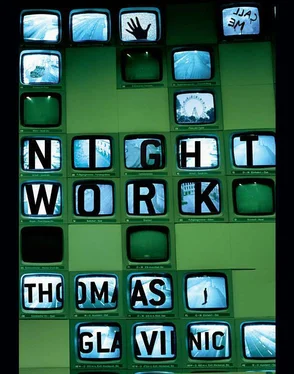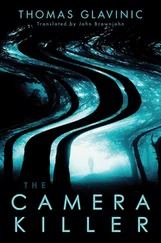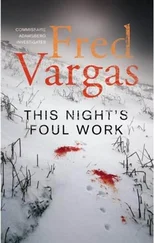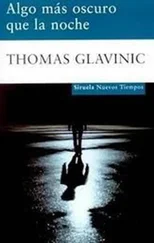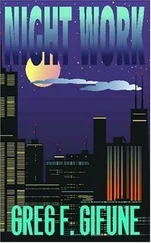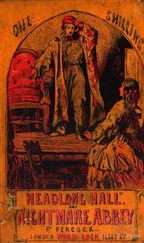Thomas Glavinic - Night Work
Здесь есть возможность читать онлайн «Thomas Glavinic - Night Work» весь текст электронной книги совершенно бесплатно (целиком полную версию без сокращений). В некоторых случаях можно слушать аудио, скачать через торрент в формате fb2 и присутствует краткое содержание. Год выпуска: 2008, Издательство: Canongate Books, Жанр: Современная проза, на английском языке. Описание произведения, (предисловие) а так же отзывы посетителей доступны на портале библиотеки ЛибКат.
- Название:Night Work
- Автор:
- Издательство:Canongate Books
- Жанр:
- Год:2008
- ISBN:нет данных
- Рейтинг книги:5 / 5. Голосов: 2
-
Избранное:Добавить в избранное
- Отзывы:
-
Ваша оценка:
- 100
- 1
- 2
- 3
- 4
- 5
Night Work: краткое содержание, описание и аннотация
Предлагаем к чтению аннотацию, описание, краткое содержание или предисловие (зависит от того, что написал сам автор книги «Night Work»). Если вы не нашли необходимую информацию о книге — напишите в комментариях, мы постараемся отыскать её.
Night Work — читать онлайн бесплатно полную книгу (весь текст) целиком
Ниже представлен текст книги, разбитый по страницам. Система сохранения места последней прочитанной страницы, позволяет с удобством читать онлайн бесплатно книгу «Night Work», без необходимости каждый раз заново искать на чём Вы остановились. Поставьте закладку, и сможете в любой момент перейти на страницу, на которой закончили чтение.
Интервал:
Закладка:
He fished a card out of his pocket.
Get out , it read.
*
Jonas drove through the streets wearing his blinkered ski goggles, which were a tight fit. He tried to distract himself as he followed the instructions of the computerised voice, so as not to register the route he was taking.
All at once he wondered if he was awake. He wasn’t sure that what he was thinking and feeling at this moment was real. Was he really here? This steering wheel, this accelerator, this gear lever, were they a part of reality? This brightness he saw through the slit in the goggles, was it the real world?
He heard a scraping sound. The car went jolting over the kerb. He braked and drove on more slowly. He felt tempted to tear off the goggles but resisted the impulse.
‘Turn right at the next intersection.’
A beep. He turned right and accelerated away.
He had read somewhere that your eyes initially saw everything inverted by 180 degrees. That they transmitted an upside-down image of the world to the brain. But because the brain knew that people didn’t walk around on their heads and mountains were broader at the base than the summit, it turned the image round. Your eyes deceived you, in a sense, and your brain acted as a corrective. Whether true or not, this posed an important question: how could he be certain that what his eyes were seeing was genuinely there?
He was really just a lump of flesh groping its way through the world. His knowledge of that world derived mainly from his eyes. They enabled him to get his bearings, make decisions, avoid collisions. But nothing and no one could guarantee that they told him the truth. Colour blindness was just one harmless example of this potential untruthfulness. The world could look like this or differently. To him it existed in only one possible form, the one allowed by his eyes. His self was a blind thing in a cage. It was all that his skin contained. His eyes formed part of this — or not, as the case might be.
The disembodied voice announced that he had reached the required destination. He pulled off his goggles.
The suburbs. Some outlying district, at all events. Expensive cars parked alongside garden fences. Detached houses with satellite dishes, balconies with ornamental plants. Jonas saw a broken branch lying in the roadway at the next intersection.
The street looked familiar. He checked the address. Something flashed through his mind, but he couldn’t pin it down. It wasn’t until he got out that the memory resurfaced: the suburban house he was standing outside was only 100 metres from the one he’d searched weeks ago. The one to which he’d been directed by his own phone messages, and in which he’d shied away from entering a particular room.
He read the name on the garden gate: Dr August Lom . He rang the bell, lifted the latch. The gate swung open with a rattling sound.
Jonas had a momentary vision of a shaggy beast cavorting around the garden on the far side of the house, its long tongue slapping each ear in turn as it lashed to and fro. The creature was only waiting for him to dare to go in.
Outside the front door, on which a wreath woven from sprigs of fir was hanging, he unslung his shotgun, listening intently. He cocked the weapon and concentrated.
Something told him that he’d reached a dead end.
He tried the door. Locked. He smashed a window. The burglar alarm went off. He registered it for a second, no longer, then it receded into the background. The moment his feet touched the carpet in the hallway, he heard nothing, smelt nothing. He set off.
A room. Furniture, a TV, pictures.
Another room. More furniture. House plants. Strangely, puzzlingly untidy.
The next room. Gym mats, a punchball, a home trainer.
And the next. Shower, bathtub, clothes horse.
He searched the place with a firm gaze and brisk movements, turned off the burglar alarm, tramped across carpeted floors, felt things, went down into the basement and up into the attic. Now and then a lucid part of his brain warned him to retract his hand or turn on his heel.
By the time he was back outside and gradually coming to his senses, he felt convinced that nothing in the house could be of any help to him. And that was all he’d wanted to know.
He smelt of sweat, he noticed as he got back into the car. It was the acrid smell he gave off when very tense. That annoyed him. There was no need to be scared, he’d proved it that night at Kanzelstein.
He was briefly tempted to put on the blinkered goggles and go back inside. Without his gun, what’s more.
‘No way,’ he said, and turned the car.
*
He was gazing at the cathedral from the terrace of the Sky Bar. His coffee cup stood untouched on the table beside him. Without really thinking, he swallowed two Diclofenac. Something was bothering him. It was minutes before he realised that they’d stuck in his throat. He washed them down with some water.
He wandered around the terrace, flapping his arms for warmth. Spat over the balustrade and saw the spittle splash-land on the canopy below.
Good. The time had come. He must leave. Preferably today. That was asking too much, but he might have completed all his preparations by tomorrow.
By a conservative estimate, at least a third of the world lay beyond his reach. He could drive to Berlin, Paris, Prague or Moscow. He could inspect the Great Wall of China. The route to the Saudi Arabian oilfields lay open to him. He could visit Base Camp below Mount Everest if he could get used to the altitude and raise enough energy for a two-week trek on foot. What he could never get to was America. And Australia. And the Antarctic.
With a feeling of envy, he recalled his youthful dream. At some stage in his life, he had promised himself, he would stand amid the ice and touch the signpost reading Geographic South Pole . However he got there, whether with a traditional expedition of the kind that was seldom undertaken these days and would probably not accept him, or whether he landed in a chartered Russian military machine, he wanted to touch that signpost, shut his eyes and think of home. Of Marie doing the shopping at that moment, of his father playing chess in the park, of Martina rejecting a design at the office. Of the alarm clock ticking away in his flat. Unnoticed, because there was nobody there. It didn’t matter to the alarm clock whether Jonas was at the South Pole or in the kitchen next door. He wasn’t there. The alarm clock was all on its own.
To touch that signpost in a white wilderness. Not to go for a walk or a short trip by car, but to be fifteen hours by air from civilisation. That had been his dream. To go as far south as possible, to indulge his yearning for far-off places.
He would never see the Pole.
Jonas sat down again and put his feet up on the balustrade. He scanned the roofs below. How old were those houses? A century-and-a-half? Three centuries? And how many people had lived in them? The world changed little — the world he knew, at any rate. But it changed constantly and lastingly. Someone was born every second, someone died every second.
Austria. What was Austria? The people who lived there. The death of someone meant no essential change. Not, at least, from the country’s point of view, only from that of the person in question. And of their relations. Austria didn’t change much when someone died. But if you compared the Austria of a few weeks ago with Austria a century ago, you could hardly claim there had been no change. No one who had lived in those houses was still alive. All were dead. All had departed one by one. A big difference from their angle, none from that of the country.
‘Austria.’ ‘Germany.’ ‘The United States.’ ‘France.’
People lived in houses they’d inherited and walked streets paved by others long before them. Then they got into bed and died, as they had to. To make room for another ‘Austria’.
Читать дальшеИнтервал:
Закладка:
Похожие книги на «Night Work»
Представляем Вашему вниманию похожие книги на «Night Work» списком для выбора. Мы отобрали схожую по названию и смыслу литературу в надежде предоставить читателям больше вариантов отыскать новые, интересные, ещё непрочитанные произведения.
Обсуждение, отзывы о книге «Night Work» и просто собственные мнения читателей. Оставьте ваши комментарии, напишите, что Вы думаете о произведении, его смысле или главных героях. Укажите что конкретно понравилось, а что нет, и почему Вы так считаете.
